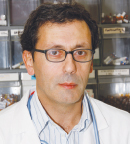
By using durvalumab, you increase the time the disease is under control, improving progression-free survival by more than 11 months.— Luis Paz-Ares, MD
Tweet this quote
THE PROGRAMMED CELL DEATH ligand 1 (PD-L1) inhibitor durvalumab (Imfinzi) improved progression-free survival by 11.2 months compared with placebo in patients with locally advanced, unresectable stage III non–small cell lung cancer (NSCLC) whose disease did not progress following standard treatment with chemoradiotherapy. These potentially practice-changing results of the phase III PACIFIC trial were presented at the European Society for Medical Oncology (ESMO) 2017 Congress in Madrid1 and published simultaneously in The New England Journal of Medicine.2 These results represent the first phase III trial results of a PD-L1 inhibitor in locally advanced NSCLC outside of the metastatic setting.
“Durvalumab is a promising new therapeutic option for patients with stage III locally advanced NSCLC,” said Luis Paz-Ares, MD, Chair of the Medical Oncology Department at the Hospital Universitario Doce de Octubre, Madrid. “We saw a clear improvement in outcome vs placebo. Progression-free survival improved with durvalumab across all prespecified endpoints. There were no new safety signals with durvalumab.”
“About one-third of patients present with stage III disease at diagnosis, and most of them are not surgical candidates. Standard treatment is platinum-based chemotherapy and concurrent radiation therapy, but most patients will relapse at a median of 9 months, and 5-year survival is 15%,” stated Dr. Paz-Ares. “By using durvalumab, you increase the time the disease is under control, improving progression-free survival by more than 11 months. We haven’t analyzed survival data yet, but we hope we can increase the percentage of patients alive at 5 years with this therapy.”
Durvalumab is already approved by the U.S. Food and Drug Administration (FDA) for the treatment of locally advanced or metastatic urothelial cancer that has progressed after treatment. In July 2017, the drug received Breakthrough Therapy designation from the FDA as a potential treatment for locally advanced, unresectable NSCLC that has not progressed following chemoradiation therapy.
ESMO Experts Commend Results
THE PACIFIC TRIAL RESULTS were greeted with enthusiasm by experts. “We have had no advances in recent years for the treatment of stage III NSCLC. The patients included in PACIFIC represent real-world patients who should be included in this trial. In my opinion, the results are promising for durvalumab,” stated Enriqueta Felip, MD, Head of the Lung Cancer Unit, Oncology Department at Vall d’Hebron University Hospital in Barcelona, who commented on the study at a formal press conference. “This is a very relevant trial for patients where we need new strategies.”

Enriqueta Felip, MD
ESMO expert Pilar Garrido, MD, PhD, Head of the Thoracic Tumour Section, Medical Oncology Department, Ramon y Cajal University Hospital, Madrid, said: “Giving durvalumab after finishing chemoradiation improved progression-free survival by threefold compared to placebo, which is a clinically relevant benefit. The results for 12- and 18-month progression-free survival were also highly encouraging. Overall survival data are awaited, but the magnitude of progression-free survival benefit supports this combination as a new standard of care for unresectable stage III NSCLC patients who had no progression following standard care with platinum-based chemotherapy and concomitant radiotherapy.”
Study Details
THE PACIFIC TRIAL is being conducted at 235 centers in 26 countries. The study included 713 patients with locally advanced, nonresectable stage III NSCLC whose disease had not progressed after platinum-based chemotherapy and concurrent radiation therapy for up to 42 days. Patients were randomized 2:1 to receive durvalumab at 10 mg/kg every 2 weeks or placebo for up to 12 months.
At baseline, both groups were well balanced. The median age was 64 years, and 91% were current or former smokers. A total of 70% were men, and 45.7% had squamous histology. Chemotherapy use was similar between the groups: 25.8% and 28.7% of the durvalumab and placebo groups, respectively, received induction chemotherapy before definitive chemoradiotherapy. Response rates to chemotherapy were similar between the two arms: 50.6% and 49.8%, respectively.
Key Findings
DURING THE ESMO CONGRESS, Dr. Paz-Ares presented results from a preplanned interim analysis at 14.5 months. Median progression-free survival was 16.8 months in the durvalumab arm vs 5.6 months with placebo, representing a 48% reduction in the likelihood of disease progression favoring the PD-L1 inhibitor (hazard ratio, 0.52, P < .0001). At 18 months, progression-free survival rates were 44.2% for durvalumab and 22% for placebo. Overall survival will be presented when the data become more mature.

The magnitude of progression-free survival benefit supports this combination as a new standard of care for unresectable stage III NSCLC patients who had no progression following standard care with platinum-based chemotherapy and concomitant radiotherapy.— Pilar Garrido, MD, PhD
Tweet this quote
The progression-free survival data favored durvalumab for all patient subgroups, including PD-L1–positive and –negative subgroups. Dr. Paz-Ares noted that patients in the trial were not selected for PD-L1 expression, but tumor tissue was collected for analysis. “Subgroup analysis according to PD-L1 expression (25% or higher = positive, ≤ 25% = negative) showed a similar benefit for PD-L1–positive and –negative patients. The confidence intervals were overlapping,” he said. Durvalumab reduced the risk of disease progression or death by 41% compared with placebo in PD-L1–negative patients and by 59% in PD-L1–positive patients (≥ 25% expression).
The overall response rate following treatment with durvalumab was 28% vs 16% for placebo. The complete response rate was 1.4% for durvalumab vs 0.5% for placebo. The median duration of response was not yet reached in the durvalumab arm vs 13.8 months with placebo.
Patients who received durvalumab experienced fewer metastatic or new lesions than placebo patients. The median time to death or distant metastasis was 23.2 months for durvalumab vs 14.6 months for placebo (P < .001). New lesions were found in 20.4% of the durvalumab group vs 32.1% of the placebo group. Fewer new brain lesions were found in durvalumab-treated patients: 5.5% vs 11% for placebo patients.
Toxicity
“THERE WERE NO NEW SAFETY SIGNALS with durvalumab,” Dr. Paz-Ares said. Adverse events of all grades were reported in 96.8% of the durvalumab group and 94.9% of the placebo group. Grade 3 or 4 adverse events occurred in 29.9% vs 26.1%, respectively. Treatment-related adverse events occurred in 67.5% and 53.4%, respectively; serious adverse events were reported in 28.6% and 22.6%, respectively.
The rate of adverse events leading to treatment discontinuation was 15.4% for durvalumab vs 9.8% for placebo. The rate of any grade 3 or 4 immune-mediated adverse event was 3.6% and 2.4%, respectively.
DISCLOSURE: Dr. Paz-Ares has received consultancy fees from AstraZeneca, Bristol-Myers Squibb, Merck Sharpe and Dohme, Pfizer, Roche, Lilly, Boehringer Ingelheim, Novartis, and Ariad. Drs. Felip and Garrido reported no conflicts of interest.
REFERENCES
1. Paz-Ares L, Villegas A, Daniel D, et al: PACIFIC: A double-blind, placebo-controlled, phase III study of durvalumab after chemoradiation therapy in patients with stage III, locally advanced, unresectable NSCLC. ESMO 2017 Congress. Abstract LBA1_PR. Presented September 9, 2017.
2. Antonia SJ, Villegas A, Daniel D, et al: Durvalumab after chemoradiotherapy in stage III non–small-cell lung cancer. N Engl J Med. September 8, 2017 (early release online).


